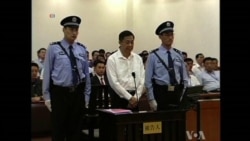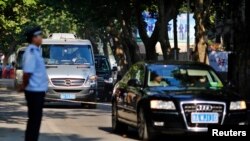BEIJING —
The trial of fallen political star Bo Xilai has begun in the eastern Chinese coastal city of Jinan - one of China’s biggest political cases in decades. And while direct access to the hearing has been tightly controlled, the Chinese public is being given an unprecedented look at the proceedings through the court’s Twitter-like microblog site online.
Most of the first day of Bo Xilai’s trial as seen through updates online was an intense back and forth between Bo and his lawyers and the prosecutors accusing him of corruption, bribes and abuse of power.
Millions of Chinese use microblogs and the court’s decision to take the trial live online was a rare example of openness, particularly for such a sensitive political case.
Rachel Lu is editor of Tea Leaf Nation, a website that monitors Chinese social media. She said that although the Jinan Intermediate Court’s microblog seemed like it would be boring when the trial started, it gradually became more and more interesting as lengthy transcripts of the trial were released along with photos and audio.
“Bo Xilai and his lawyers are basically disputing all of the evidence laid out against him, so everyone I think is a bit surprised where this is going,” said Lu.
Prosecutors said Bo used his wife, son and others to pocket more than $4 million in cash and property. A large portion of Thursday’s proceedings focused on allegations Bo accepted bribes from the head of a development corporation while serving as mayor and party chief of China’s northeastern city of Dalian.
Bo denies ever accepting any bribes. Unlike previous cases involving high-ranking officials, he appears to be digging in for a drawn out struggle over his charges.
Analysts, however, said that while he’s putting up a fight it’s likely that the final ruling in the case has already been decided.
Chinese state media said the trial would be wrapped up by Friday.
“I think the result will not be decided by a judge or by this court, it has been decided by the top leaders. So, it is only a show. It is more open than what we expected, but it is still a show,” said Michael Anti, a columnist and Chinese Internet watcher.
The hearing not only revealed fresh details about the corruption charges against Bo, but also indicated that a host of investigations against those involved, including Bo’s wife were also being pursued. Bo’s son was also listed as a recipient of bribes for his father, but court documents posted online did not say he was being investigated as well.
The indictment posted online said that in addition to the charges of corruption and bribe taking, Bo also abused power when he tried to block the investigation of his wife’s murder of a British businessman.
2012
2013
The exposure of the murder not only triggered Bo’s downfall, but also sent shockwaves through China’s political leadership at a time when the country was in the midst of once-in-a-decade leadership reshuffle.
Analysts said Chinese authorities were handling the case with extra care to ensure that the focus remained on Bo’s personal actions and not broader concerns about widespread corruption among Chinese officials.
Bo largely painted himself as a victim during the trial session on Thursday and said that he was unaware of the bribes he was accused of receiving.
In response to questions about corruption linked to his wife, Bo testified that for much of the past decade he and his wife were living apart. She was overseas as he gradually worked his way up from Dalian to Commerce Minister and party boss of Chongqing.
Rachel Lu said that the openness of the trial in part seemed to be a sign of authorities’ confidence about how the trial would work out.
“I think probably they want to make this a milestone in China’s legal development, trying to show the world that on this very important trial there is opening and transparency and that Bo Xilai is able to defend himself,” said Lu.
Foreign reporters were kept at a distance from the trial and most had to rely largely on the updates online. Officials said that of the more than 100 individuals who attended the hearing, 19 were journalists.
Most of the first day of Bo Xilai’s trial as seen through updates online was an intense back and forth between Bo and his lawyers and the prosecutors accusing him of corruption, bribes and abuse of power.
Millions of Chinese use microblogs and the court’s decision to take the trial live online was a rare example of openness, particularly for such a sensitive political case.
Rachel Lu is editor of Tea Leaf Nation, a website that monitors Chinese social media. She said that although the Jinan Intermediate Court’s microblog seemed like it would be boring when the trial started, it gradually became more and more interesting as lengthy transcripts of the trial were released along with photos and audio.
“Bo Xilai and his lawyers are basically disputing all of the evidence laid out against him, so everyone I think is a bit surprised where this is going,” said Lu.
Prosecutors said Bo used his wife, son and others to pocket more than $4 million in cash and property. A large portion of Thursday’s proceedings focused on allegations Bo accepted bribes from the head of a development corporation while serving as mayor and party chief of China’s northeastern city of Dalian.
Bo denies ever accepting any bribes. Unlike previous cases involving high-ranking officials, he appears to be digging in for a drawn out struggle over his charges.
Analysts, however, said that while he’s putting up a fight it’s likely that the final ruling in the case has already been decided.
Chinese state media said the trial would be wrapped up by Friday.
“I think the result will not be decided by a judge or by this court, it has been decided by the top leaders. So, it is only a show. It is more open than what we expected, but it is still a show,” said Michael Anti, a columnist and Chinese Internet watcher.
The hearing not only revealed fresh details about the corruption charges against Bo, but also indicated that a host of investigations against those involved, including Bo’s wife were also being pursued. Bo’s son was also listed as a recipient of bribes for his father, but court documents posted online did not say he was being investigated as well.
The indictment posted online said that in addition to the charges of corruption and bribe taking, Bo also abused power when he tried to block the investigation of his wife’s murder of a British businessman.
Timeline of the Bo Xilai Scandal
Timeline of the Bo Xilai Scandal2012
- February 2: Bo's key ally and Chongqing police chief Wang Lijun is demoted
- February 6: Wang visits U.S. consulate in Chengdu
- March 15: Bo dismissed as Chongqing party chief
- March 26: Britain asks China to investigate November death of Briton Neil Heywood in Chongqing
- April 10: Bo suspended from Communist Party posts. China says Gu is being investigated for Heywood's death
- August 20: Gu given suspended death sentence after confessing to Heywood's murder
- September 24: Wang convicted of defection, power abuse and bribe taking
- September 28: Communist Party expels Bo
2013
- July 25: Bo indicted for bribery, corruption, abuse of power
- August 22: Bo trial begins in Jinan
- September 22: Bo sentenced to life in prison
Analysts said Chinese authorities were handling the case with extra care to ensure that the focus remained on Bo’s personal actions and not broader concerns about widespread corruption among Chinese officials.
Bo largely painted himself as a victim during the trial session on Thursday and said that he was unaware of the bribes he was accused of receiving.
In response to questions about corruption linked to his wife, Bo testified that for much of the past decade he and his wife were living apart. She was overseas as he gradually worked his way up from Dalian to Commerce Minister and party boss of Chongqing.
Rachel Lu said that the openness of the trial in part seemed to be a sign of authorities’ confidence about how the trial would work out.
“I think probably they want to make this a milestone in China’s legal development, trying to show the world that on this very important trial there is opening and transparency and that Bo Xilai is able to defend himself,” said Lu.
Foreign reporters were kept at a distance from the trial and most had to rely largely on the updates online. Officials said that of the more than 100 individuals who attended the hearing, 19 were journalists.






